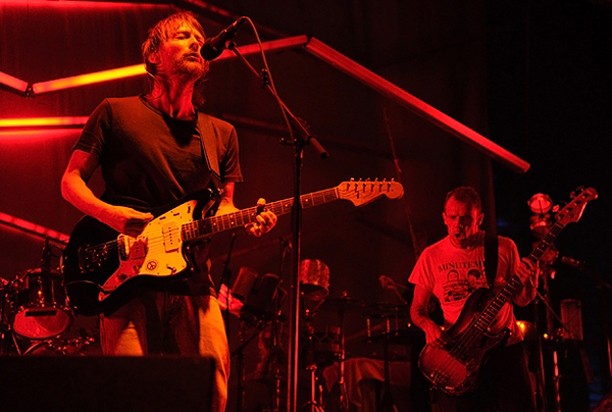If you’re willing to put aside the fact that Atoms For Peace sound almost exactly like you’d expect them to, Amok comes across remarkably well. A supergroup in its personnel, if not its execution, Atoms For Peace bring the singular decade-long partnership between Radiohead singer/songwriter Thom Yorke and Radiohead/Ultraista producer Nigel Godrich into a new age.
The bleeps and rickety drum samples found on Radiohead’s 2011 album The King of Limbs were merely a hint of the Afro-rhythms that dominate tracks like Amok’s “Default.”
Coasting along on Yorke’s soaring vocals and a processed bassline right from Godrich’s Ultraista project, “Default” almost comes off as too safe for the famously experimental duo. Maybe it is because both Yorke and Godrich have so thoroughly accomplished the sound of “Default” before that Amok doesn’t truly hit its stride until its third song, “Ingenue.”
With “Ingenue,” Atoms for Peace sound far more willing to explore other facets of their sound alongside the trademarks of Yorke and Godrich, including a wonderful synth sample that writhes about Yorke’s plaintive vocals and the very welcome basslines of Red Hot Chili Peppers bassist Flea. If there is one complaint about the album, it is that Flea isn’t spotlighted enough.
Even so, the band comes up with enough wild sounds to make any Radiohead rival jealous,like the hiccupping keyboards of album highlight “Dropped” or breakdown of “Unless,” which features multiple recordings of wailing Yorke battling throughout the song.
Perhaps even more than Radiohead has in recent years, Atoms For Peace manages to complement the astounding flexibility of Yorke’s upper range, giving his inimitable voice real depth.
The second half of Amok doesn’t drastically vary the sounds established by “Ingenue” and “Dropped,” though there are certainly moments that stand out as adventurous. “Judge Jury and Executioner” finds Flea’s bass tone sharing the stage with, of all things, an acoustic guitar.
The combination is noteworthy simply because of the electronic, sampling-heavy feel that permeates the rest of the album. Yet the song still smacks of classic Godrich production, its off-kilter handclaps serving as a resonant counterpoint to Yorke’s ethereal presence.
Amok’s penultimate track, “Reverse Running,” also makes excellent use of a guitar in the form of a lead that dances along in the right speaker with the fervor of Radiohead’s best moments. Halfway through the track, Yorke even drops himself into a self-sampling hall of mirrors a la Kid A’s (2000) “Everything In Its Right Place.”
“Reverse Running” never sits still for more than a minute before breaking off into something like a buzzy cacophony.. As such, it handily earns a its place as perhaps the best Atoms For Peace song.
That is, of course, with the exception of the majestic title track that closes out the record.
Amok features so many layers of sound and instruments that each successive listen further reveals just how meticulously produced it is — Think piano crescendos, a small militia of synthesizer tones and uniquely restrained Yorke vocals that sound at once defeated and peaceful.
Amok may not revolutionize the industry, but it stands as a worthy testament to the powerful vision of two men and a record collection.









